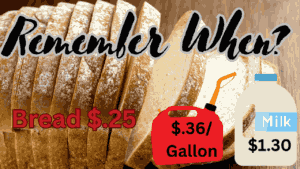
This article will attempt to break down the complexity of the stimulus package, interest rates, and inflation into something a little more relatable.
Imagine you have a big jar of cookies, and each cookie represents Money. When the government decides to give people more cookies (money) through a stimulus package, it can sometimes lead to a problem called inflation.
Inflation is when the prices of things you want to buy go up, and you need more cookies (money) to buy the same things. So, if the government gives out too many cookies (money) to everyone, there will be a lot of cookies (money) going around.
When there are too many cookies (money) in the hands of people, they start to spend more because they think they have a lot. The stores can’t make more items like toys, games, and candy bars as they do not have the raw materials in mass quantities of surplus (supply vs demand). In turn, companies might raise the prices of these things because they know people have more cookies (money) to spend.
As a direct result of receiving more cookies, the prices are higher, you need more cookies (money) to buy the same things. So, you might think you have more cookies (money) initially, but in reality, the cookies (money) are not worth as much because prices are higher. This increase in price can change quickly or slowly depending on the item being purchased. This can make it harder for people to afford the things they need.
A stimulus package can sometimes hurt us with inflation because it can make the candies (money) lose their value, and we end up needing more of them to buy the same stuff we used to get for fewer candies (money).
Now that there is a basic level of understanding of how the recent stimulus package works, worked or is working. Knowing that the stimulus package has a direct correlation to inflation, where are we in this mess that the government put us in?
The truth, the government does not know. The government can give you their best guess, but really it is just that, a guess. There have been many economists to speak about this and articles are written saying that they thought that stage one was completed. Is it though? On a large scale for individuals, this would probably be a good guess, but how many companies or states received large sums of money that have yet to spend it. A case in point would be the state of Wisconsin.
Wisconsin in as recently as May/June of ’23 had been working on budget planning on how to spend their surplus, which in turn is being known to be largely because of the COVID-19 relief money. Estimating the State’s surplus to be in the neighborhood of $ 7 billion. Please note, that not all the surpluses can be tied directly to the stimulus as the state continues to collect tax dollars.
Corporations were not mentioned in the above because they are in a category for themselves. If a corporation has been around for 50,100 or longer, they have seen many different business cycles. There is no way to properly track this because not all companies are publicly traded, and their financials are not available for review. The assumption is that the average business loan rates have been historically higher than rates during the pandemic. If a corporation needed money, they might have chosen to take the pandemic money and bank it for a rainy day similar to the State of Wisconsin. Then op to take a low-interest rate loan until rates climb back to historic rates or higher.
Trillions were handed out during the pandemic, has the largest percentage of the money been spent?
The government has been banking on the majority has or will soon be. Then hope that this money gets re-spent multiple times, buying more raw materials to make a product, paying employees and the money cycle continues or is almost through the referenced money cycle.
How do the corporations and states listed above relate to inflation and the government raising interest rates?
Once again, the Federal Reserve and the government track and pump out economic data all the time, but it is old and lagging. The Fed uses this to make an educated guess and raise interest rates to keep inflation under control. This is what you saw in ’22. The tricky part is yet to come, the government knows that there are Billions if not Trillions of dollars out there in large corporations and states yet to be spent.
The general public is already feeling the pain from the rising costs for goods and services, which in turn makes the public feel like they are poor and right back where they started. The stock market has already built its assumptions into hoping rates stay the same. However, once this additional money is spent by businesses and corporations, it will again have a ripple effect that will make it look like on paper that there is inflation going on when in turn it is still stimulus money that has yet to be spent.
It is great that the government is shooting for this “soft landing,” but can they achieve it? Given the lower consumer sentiment and personal discretionary spending, spending is slowing. The harsh truth is that once the corporations and states spend their pandemic money this could trigger another round of inflation and interest rate hikes that will increase the probability of throwing the Economy into a recession.
Sources:
https://pbswisconsin.org/news-item/wisconsins-estimated-state-budget-surplus-hits-7-1-billion/
https://amiba.net/local-multiplier/
https://www.gobankingrates.com/banking/interest-rates/see-interest-rates-last-100-years/
https://www.bea.gov/system/files/pi0823.png
Originally Published on https://pointwealthmanagement.com/blog/
Notifications